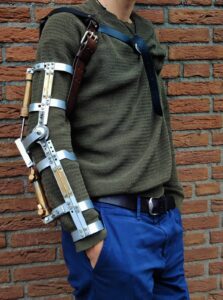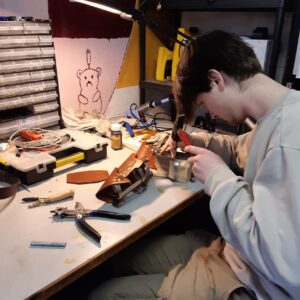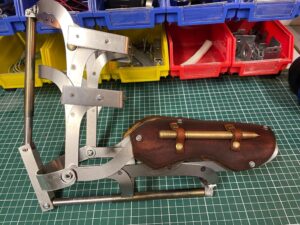Professional Identity
Who I am as a Designer, and how my norms, values and believes influence my design
09/10/2024
Business & Entrepreneurship
In my bachelor I participated in one Quartile of a project focused on building a successful startup, where we had to develop everything relevant to it, and also the social connections for it. Proof for this can be found at https://jessestrijker.com/business-project/, where you will be met with a video introducing the product, and a summary of the project. To reflect on this project, the main things I learned where technical takeaways, such as how to devise a business plan or how to execute a pitch.
I also was part of an actual startup for 2 years focused on compartmental cosplay/larp items. (larp stands for live action roleplay) Here I built up a lot of knowledge and experience on the difficulties and reaching your market and connecting to them, and tailoring to their needs. So user inclusive design. I also grew a lot in my programming and prototyping skills, building the website and producing actual products. The website: https://fantasysmith.nl/ (currently no longer online) was nearly completely made by me, and the products were made in cooperation with my teammates, whom studied mechanical engineering and industrial design engineering in Twente. A main takeaway from the startup is the difficulty of connecting to customers, definitely with a niche market such as ours, making a webshop and advertising that was not the way to go. A way more effective way was making personal connections and cold calls to organizers of events related to cosplay and larp. So a lot of the knowledge from these projects is highly contextual.
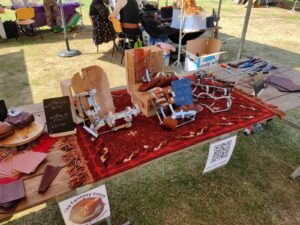
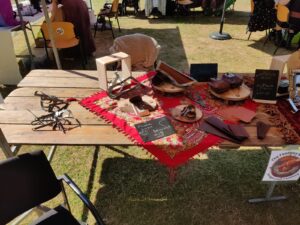
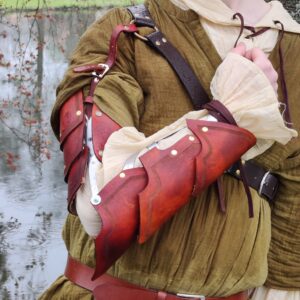
Creativity & Aesthetics
Even though I really like working on technical projects, for me it is a really important factor that it looks good. This also keeps me motivated. I designed multiple games or interactive digital environments of which aesthetics are always an important part for me. See projects below for reference or proof.
https://jessestrijker.com/new-website/
https://jessestrijker.com/interactive-media-project/
https://jessestrijker.com/python-programming-assignment/
https://jessestrijker.com/have-fun-and-play/
But creativity is also important, an important aspect of creation for me is that I don’t want to rip off existing things, i want to create new stuff. At first i really struggled with how to balance taking inspiration with creating my own creations. When does something become your own and when does it too strongly resemble your source of inspiration. One thing I learned from a lot of these projects is how to combine inspiration with your own ideas, and add your own style/twist to it.
Math, Data & Computing
This expertise area is one that I adore. Getting lost in issues, and spending a lot of time solving them. This is very prevalent in programming and is thus an activity I enjoy doing. Hard skills/knowledge here include mainly programming skills, in java, js, python, c# and c++.
https://jessestrijker.com/intelligent-interaction-design/
https://jessestrijker.com/data-physicalization-project/
https://jessestrijker.com/data-visualization/
But the most important skill to have learned is to know how to troubleshoot and bugfix. Knowing how to use search engines is legit a skill a lot of people lack, and one that is very valuable in the field of computing. For this area I have the attitude that anything is doable with enough time and access to an internet connection.
Technology & Realization
In my bachelor I also had to build actual prototypes and installations, working with Arduino, raspberry pi, sensors and other electronics, building my own boards, etc. Realizing ideas is a fun aspect of any project. Although the joy I get from troubleshooting in the previous expertise area is less present in this area. I mainly have skills and knowledge on electronics, but would like more knowledge on skills on handling actual material tools. So knowing how to sew, woodwork, metalwork, or work with any other materials, to be able to realize my concepts.
https://jessestrijker.com/data-physicalization-project/
User & Society
An important part of any design process is stakeholder inclusive design, which is told in my bachelor of course, but I also found out during my work in-between my bachelor and master. The company I worked for was very small and working with Google drive for everything (student oversights and stuff. And making all planners by hand) (taking up a lot of time making them again each year), which was quite inefficient, so I built a desktop application for them getting all inputs in one place, automating some stuff and using the google drive as a database of sorts. In this project including the future users really helped shape the interface and useful tools.
https://jessestrijker.com/management-tool/
https://jessestrijker.com/business-project/
I have also had multiple ethical subjects on understanding any potential impact of your design and how to look at different angles you might have previously not thought of, on how your product influences anything.
Identity
I am a designer with a strong affinity for technology, I love the problem solving aspect of programming, the beautiful visualization of data, and the technical applications of hardware and electronics.
In my bachelor studies of Creative Technology in Twente and in my personal projects, where I made an Information system for my employer, that managed students in a more efficient way than their previous method [2]. I have witnessed the important value of Stakeholder Inclusive Design as defined by Mumford (1983) [1], who presents three different ways of being user inclusive: consultative participation, representative participation, and consensus participation. Including stakeholders or users in the design can be a very valuable way of creating actual value with the project, because actual user adaptation is increased tenfold.
As a designer I like to work in an iterative manner, there are probably a 100 methodologies that incorporate this and have a specific name, but I don’t like to strictly adhere to those theoretical methodologies. I like to take the useful parts and incorporate them into my own process, and thus kind of build my own process. This process needs to be very adaptive and flexible in any project.
As a person I am structured and prefer clear overview before jumping into projects other people depend on. Ironically for any personal project I prefer just jumping in, and sometimes ineffectively, learning along the way. As an example I can provide that for assignments I prefer knowing the exact assignment and grading rubric and the theory related to it. But for a personal project I tend to watch maybe one youtube video and just start trying, just start 3D modeling or just start programming without planning it out.
I feel this maybe leads back to the fact that I am very acknowledgement driven and if that is not the case I depend on internal motivation which is most present when just jumping in it and doing it. What inspires me is learning more and more skills and knowledge, and keeping to broaden my skillset. This might also be a pitfall because it makes it hard to be/keep being motivated to deepen my skills and knowledge on certain subjects.
I like to stay very optimistic and open-minded, since beside it being a pleasant property for people around me, it is also a useful attitude to have for yourself. It helps with motivation and creativity in any process. In team settings I do like to have a managing position and be the connecting factor between disciplines. From my bachelor education I am pretty broadly educated in different areas of expertise. So I hope to know just enough of all sorts of things to be able to help coordinate projects in a manner, and make people feel like they are being understood and all ideas/input can be incorporated. My personal values are related to feeling like everyone can contribute in some manner and should never be prematurely excluded, and should actively be encouraged to participate, because even with language barriers and miscommunications new ideas can sprout.
My personal vision has a focus on life-long learning, problem solving, creativity and also a holistic approach to life. Since this is a new thing for me i must say I originally struggled a bit with the vision part. Since this is a vision of society, and I don’t think a lot of people have that, without actively thinking about it and having actively picked one. But i do have a vision on my own personal development: I want to be able educate myself as broadly as possible because i feel like life is more valuable with a broad skill and knowledge set and you can get more out of it by solving problems creatively. Rather with just one angle of specification. This might not be exactly my vision on designing but more a vision on me as a person, but I feel design is one of the most excellent carriers for executing this vision, because it allows for broad learning directions.
Therefor an expertise area(EA) that is really suiting for me is the Technology and Realization area. From the information page: “They can communicate with engineers from different disciplines (e.g. Electrical Engineering, Computer Science, Mechanical Engineering) and understand their scientific writings.”
They know what they are talking about and can be a connecting factor is something I’m looking for to be in many projects.
Another one of the expertise areas I want to mainly focus on is User and Society. I feel like this EA is crucial in pretty much all projects. Because what use is there if it isn’t of any value to users or society. You can develop the most amazing product but if you cant reach anyone with it or get any adaptation, what use is it.
[1]. Eva Y W Wong en Graham Tate. 1994. A study of user participation in information systems development. _Journal Of Information Technology_ 9, 1: 51–60. https://doi.org/10.1057/jit.1994.6
[2]. https://jessestrijker.com/management-tool/
This is a chart showcasing my hard skills, you can hover over them to see where they for example originated from.
